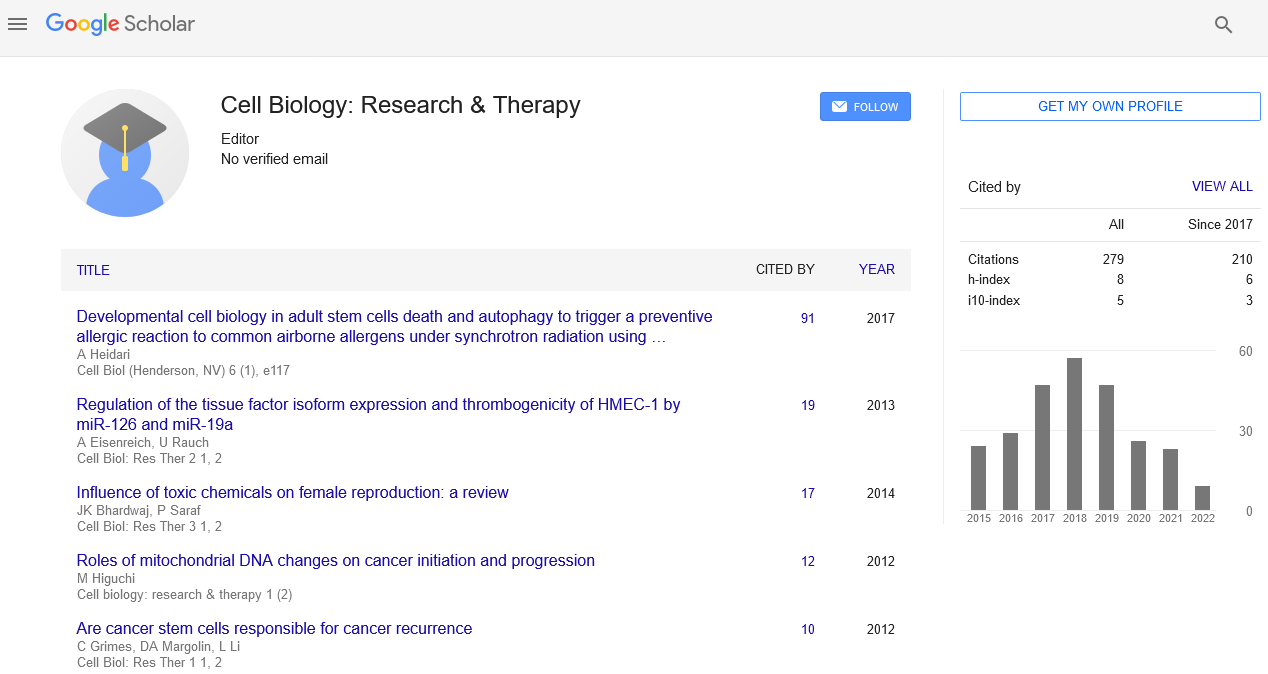Short Communication, Cell Biol Vol: 12 Issue: 4
Exploring Mitochondrial Dysfunction in Diseases: Insights into Cell Biology and Therapeutic Strategies
Cooper Evans*
1Department of Cellular and Gene Therapies, California Institute of Technology (Caltech), Pasadena, USA
*Corresponding Author: Cooper Evans,
Department of Cellular and Gene
Therapies, California Institute of Technology (Caltech), Pasadena, USA
E-mail: evanscooper@gmail.com
Received date: 27 November, 2023, Manuscript No. CBRT-24-125273;
Editor assigned date: 29 November, 2023, Pre QC No. CBRT-24-125273 (PQ);
Reviewed date: 14 December, 2023, QC No. CBRT-24-125273;
Revised date: 21 December, 2023, Manuscript No. CBRT-24-125273 (R);
Published date: 29 December, 2023, DOI: 10.4172/2324-9293.1000199
Citation: Evans C (2023) Exploring Mitochondrial Dysfunction in Diseases: Insights into Cell Biology and Therapeutic Strategies. Cell Biol 12:4.
Description
Mitochondria are essential cellular organelles responsible for energy production, metabolism, and various cellular processes. When these dynamic organelles experience dysfunction, it can lead to a cascade of cellular events and contribute to the pathogenesis of various diseases. This study explores the role of mitochondrial dysfunction in diseases, highlighting insights from cell biology research and discussing potential therapeutic approaches aimed at restoring mitochondrial health [1]. Mitochondria play a central role in cellular energy production through oxidative phosphorylation. This process involves the electron transport chain and ATP synthesis, providing the energy currency for cellular activities.
Mitochondria are involved in diverse cellular processes, including metabolism, calcium regulation, and apoptosis. They contribute to cellular signaling pathways that influence cell survival, proliferation, and differentiation. Mitochondrial dysfunction is implicated in neurodegenerative diseases such as Alzheimer's, Parkinson's, and Huntington's. Mitochondrial abnormalities contribute to energy deficits, oxidative stress, and neuronal damage, playing a role in disease progression [2].
Diseases of the cardiovascular system, including heart failure and ischemic heart disease, often involve mitochondrial dysfunction. Impaired energy production and increased oxidative stress contribute to cardiac dysfunction and structural changes in the heart. Mitochondrial dysfunction is linked to metabolic disorders like diabetes and obesity. Impaired mitochondrial function affects glucose metabolism and insulin sensitivity, contributing to the development of insulin resistance [3].
Altered mitochondrial function is observed in many cancers. While some cancers exhibit increased mitochondrial biogenesis and energy production, others experience mitochondrial damage and dysfunction, leading to metabolic reprogramming and cancer cell survival. Cell biology research has uncovered the intricate processes of mitochondrial biogenesis, where new mitochondria are formed to replace damaged ones. Understanding the regulation of biogenesis provides insights into potential therapeutic strategies [4]. Mitophagy is a cellular process that removes damaged or dysfunctional mitochondria. Research into mitophagy mechanisms reveals how cells selectively target and degrade impaired mitochondria, maintaining overall mitochondrial health.
Cell biology studies have elucidated the role of oxidative stress in mitochondrial dysfunction. Antioxidant defense mechanisms, including enzymes like superoxide dismutase and glutathione peroxidase, are crucial for mitigating oxidative damage to mitochondria. Targeting oxidative stress with mitochondria-specific antioxidants represents a potential therapeutic approach. Compounds like MitoQ and SkQ1 are designed to accumulate within mitochondria, neutralizing reactive oxygen species and protecting mitochondrial function. Stimulating mitochondrial biogenesis using compounds like resveratrol and exercise mimetics offers a strategy to enhance mitochondrial function. These modulators can promote the generation of new, healthy mitochondria.
Enhancing mitophagy is a therapeutic avenue to remove damaged mitochondria. Research into small molecules or drugs that can induce mitophagy may offer ways to selectively clear dysfunctional mitochondria from cells. Therapeutic interventions focusing on metabolic modulation aim to improve mitochondrial function. This includes targeting metabolic pathways, such as enhancing fatty acid oxidation or improving mitochondrial respiration, to alleviate metabolic stress on mitochondria.
Achieving precision in targeting mitochondrial dysfunction remains a challenge. Developing therapies that selectively modulate specific aspects of mitochondrial function without causing unintended consequences is crucial. Identifying reliable biomarkers for mitochondrial dysfunction is essential for disease diagnosis and monitoring treatment responses. Cell biology research is ongoing to discover molecular markers that reflect the status of mitochondrial health in various diseases [5-10].
Conclusion
Mitochondrial dysfunction is a common denominator in diverse diseases, impacting cellular energetics and contributing to pathological processes. Cell biology research has unraveled the intricate mechanisms governing mitochondrial function and dysfunction, providing a foundation for therapeutic exploration. The development of targeted approaches, such as mitochondrial antioxidants, biogenesis modulators, and mitophagy inducers, holds promise for mitigating mitochondrial dysfunction and improving overall cellular health. As research advances, the understanding of mitochondrial biology will continue to shape innovative therapeutic strategies, offering new avenues for treating diseases associated with mitochondrial dysfunction.
References
- Volarevic V, Ljujic B, Stojkovic, Aleksandra L, Nebojsa A, et al. (2011) Human stem cell research and regenerative medicine: Present and future. Br Med Bull 99:155-168.
- Volarevic V, Erceg S, Bhattacharya SS, Petra S, Philip H, et al. (2013) Stem cell-based therapy for spinal cord injury. Cell Transplant 22:1309-1323.
- Turner L, Knoepfler P. (2016) Selling stem cells in the USA: Assessing the direct-to-consumer industry. Cell Stem 19:154-157.
- Smith AG (2001) Embryo-derived stem cells: Of mice and men. Annu Rev Cell Dev Biol 17:435-462.
- Zhang X, Stojkovic P, Przyborski S, Michael C, Lyle A, et al. (2006) Derivation of human embryonic stem cells from developing and arrested embryos. Stem Cells 24:2669-2676.
- Thomson JA, Itskovitz EJ, Shapiro SS, Waknitz MA, Swiergiel JJ, et al. (1998) Embryonic stem cell lines derived from human blastocysts. Science 8:1145-1147.
- Reubinoff BE, Pera MF, Fong CY, Alan T, Ariff B, et al. (2000) Embryonic stem cell lines from human blastocysts: Somatic differentiation in vitro. Nat Biotechnol 18:399–404.
- de Trizio E, Brennan CS (2004) The business of human embryonic stem cell research and an international analysis of relevant laws. J Biolaw Bus 7:14–22.
- Mayor S (2015) The shifting geography and language of cell biology. J Cell Bio 209(3):323-325.
- Stojkovic M, Stojkovic P, Leary C, Vanessa JH, Lyle A, et al. (2005) Derivation of a human blastocyst after heterologous nuclear transfer to donated oocytes. Reprod Biomed Online 11:226–231.
 Spanish
Spanish  Chinese
Chinese  Russian
Russian  German
German  French
French  Japanese
Japanese  Portuguese
Portuguese  Hindi
Hindi 